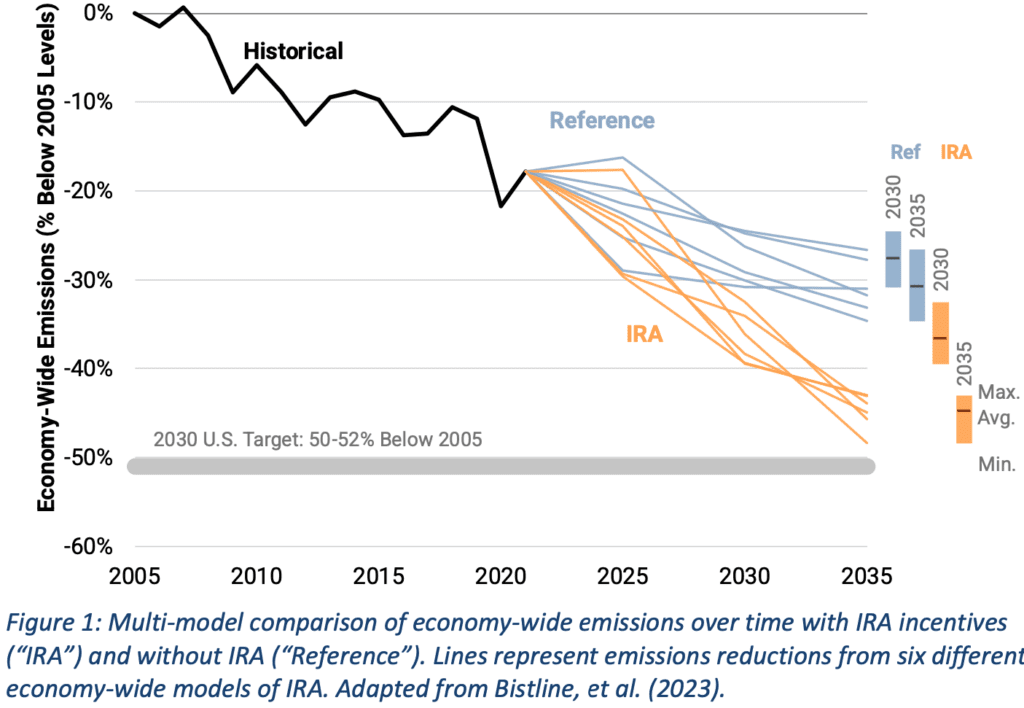
In this edition we’ll look at the latest projections of how the Inflation Reduction Act (IRA) will impact US carbon emissions, as well as its political durability. We’ll also look at how in Europe carbon prices are falling, while the Chinese EV industry is making inroads based on their low cost advantage. Finally, the climate data isn't improving, with oceans proving the latest example of accelerating change.
Future impact of the IRA – The National Bureau for Economic Research (NBER) published its most recent analysis of the IRA under several different scenarios post 2024 election. These include extremes from completely rolling it back, to complimenting it with carbon taxes/carbon price. The range of outcomes is wide, but under any scenario, the US emissions profile is most encouraging with the IRA in place. The most impactful option would be to add a carbon tax, with a particular focus on fossil fuel exports. Although no scenario is seen to hit the Biden administrations 2030 targets, the more aggressive scenarios are only a few years off target.

Political durability of the IRA – One of the key rationales for the NBER study is to look at what might happen under different administrations after the 2024 election. As one pathway involved the repeal of the IRA, that has prompted speculation that a Trump administration would look to completely undo the IRA. We find that highly unlikely, as the majority of the spending is going to heavily republican geographies, by design. Indeed, GOP Representative Garret Graves told Asios news that a full IRA repeal “realistically isn’t happening.” It remains to be seen if certain specific programs would be pared, but we take comfort knowing that most of the policy is likely to be in place regardless of the political outcomes.
Is European carbon price collapse a condemnation of cap and trade? – Over the past several months, the price of carbon on the European ETS has fallen dramatically, from roughly 100 euro to less than 60 euro. The key drivers are multiple: record wind, solar and nuclear power production, higher natural gas price (Russia/Ukraine) reducing consumption, relatively warm winter, etc. What we find most consequential is that the growth in low or zero carbon power is causing utility sector emissions to fall faster than the regulated requirements that would support higher carbon prices. Our takeaway from this is that if the US does add a carbon tax or cap and trade system, the flexibility to adjust as the power sector responds will be key to getting the most out of the system.

Will your next car be Chinese? A core component of the IRA is support for EV adoption. Most recently, European car manufacturers have been asking parts suppliers to reduce their prices to enable them to compete with lower cost Chinese EVs. Given the scale of production and learning curve experience that many of the Chinese EV makers now have, their prices are systematically lower than comparable vehicles from European manufacturers. With the US as the second largest car market in the world, the only factor that would prevent Chinese companies from flooding the US market with more affordable EVs is political push back(tarrifs, etc.). If the Democrats retain control of the presidency, it will be interesting to see how they balance the desire to electrify our transit system for carbon reduction vs. the geopolitical economic competition with China.
Enjoy swimming in the warm ocean this year - The New York Times recent article on latest trends in ocean temperature highlights how extraordinarily warm the ocean has been by almost any standard, especially in the North Atlantic. This continues the recent trend of climate data being more dire than expected. One knock on effect is a potentially devistating hurricane season as warm water fuels larger hurricanes. The other concerning trend is the impact on sea ice, as warmer waters reduce sea ice formation, which in turn changes broader ocean circulation. This negatively reinforcing cycle is what many scientists are most concerned about. Although it's looking like a great year to vacation at the beach, we look forward to having a colder ocean back.
